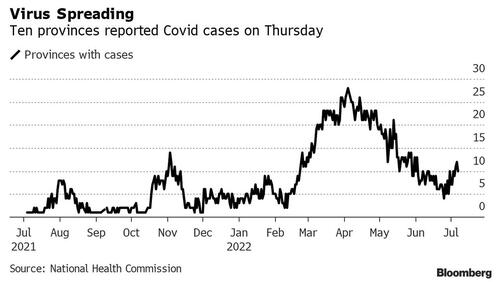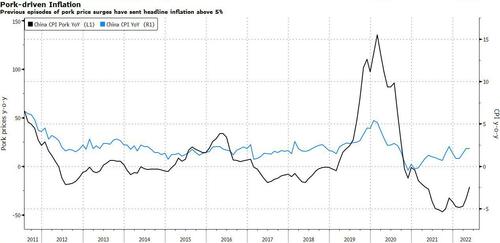China Tariff Hope Overshadowed by Covid, Pork-Price Risks
By George Lei, Bloomberg Markets Live Commentator and Reporter
Three things we learned last week:
1. Speculation about likely US tariff cuts had little immediate impact on Chinese financial markets. President Joe Biden said on Friday he hasn’t decided whether to roll back any of the levies. The offshore yuan gained 0.2% versus the greenback last week, its onshore counterpart rose 0.1% and China’s benchmark CSI 300 index declined 0.9%, its first weekly drop in six.
Among sectors that potentially may benefit from tariff rollbacks, a gauge of light industry manufacturing stocks fell more than 2.5% last week, textile and clothing gained 0.3% while the electrical and household appliances group was down 0.8%. The mixed reactions suggest that investors have moved on from trade headlines to focus on other catalysts.
2. The Chinese economy, particularly consumer spending and investment, is on a solid path of recovery — evidenced by strong car sales and falling inventories of steel rebar used in construction. Beijing is also mulling fresh fiscal stimulus through early bond sales. Still, a new Covid wave appears to be in the making, possibly derailing the economic rebound if Beijing’s Zero Covid policy remains intact.
The National Health Commission said last week that the omicron BA.5 sub-variant was already detected in some of northern China’s most important cities such as Beijing, Tianjin and Xi’an. Experiences in other Asian countries including Singapore and Malaysia suggest BA.5 will almost certainly lead to another surge of cases.
“The probability of a new Omicron wave is rising again” and “the risk of a downswing in the Covid Business Cycle should not be underestimated despite a sizable amount of stimulus rolled out in 2Q,” warned Nomura economists Ting Lu, Jing Wang and Harrington Zhang.
3. The specter of soaring domestic inflation may be getting closer. Last week, hog futures in Dalian climbed to a one-year high and Beijing summoned the biggest pork producers to warn them against inflating prices. Officials also suggested opening up state reserves to deter speculators.
Through iron-fisted crackdowns on commodities speculation, such as coal price caps, China has so far avoided the type of runaway inflation that is haunting much of the world. When it comes to pork prices, however, authorities have a spotty record.
In 2011 as well as late-2019/early-2020, pork prices soared more than 50% annually and sent headline inflation above 5%. And pork prices in the two-week period through July 5 soared more than 40%. If that momentum persists and the economic rebound picks up steam, it may create a perfect storm that leads the PBOC to scale back easing or even consider tightening.
Tyler Durden
Mon, 07/11/2022 – 06:30
Zero Hedge’s mission is to widen the scope of financial, economic and political information available to the professional investing public, to skeptically examine and, where necessary, attack the flaccid institution that financial journalism has become, to liberate oppressed knowledge, to provide analysis uninhibited by political constraint and to facilitate information’s unending quest for freedom. Visit https://www.zerohedge.com

